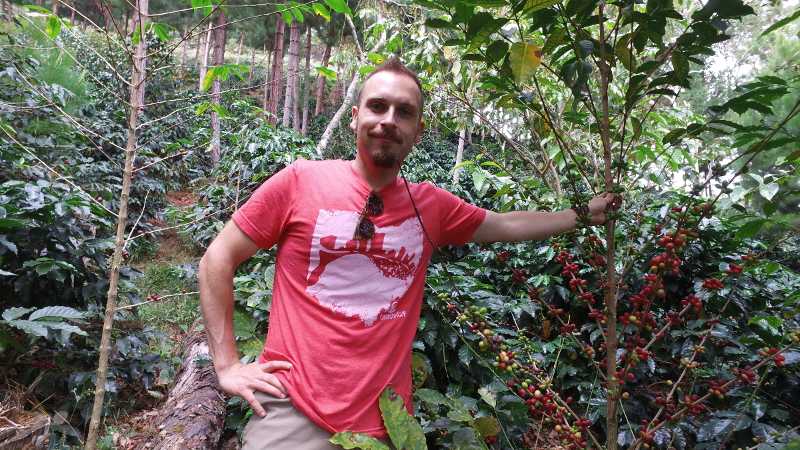COLUMBUS, Ohio – Brandon Bir (picture), coffee sourcing and education manager for Columbus coffee roaster Crimson Cup Coffee & Tea recently traveled into Peru’s Andes Mountains to expand relationships with coffee farmers, agronomists, and others dedicated to improving the quality of the country’s coffee.
While there, the licensed coffee Q Grader led judging for a coffee competition in the Junín region.
Bir’s trip originated in Lima. While visiting the capital city, he shared samples of Crimson Cup’s Ethiopian Kossa Kebena and 1991 Blend coffees with local coffee houses and coffee cuppers.
“We had some great discussions about Peruvian coffees, Lima’s coffee culture and how things are evolving,” he said. “They have some well-put-together cafés, and everyone’s competing for exceptional coffees.”
“Local coffees are getting better every year, with better coffees scoring in the mid-80s on the 100-point coffee quality scale,” he added. “In the past, they were known for their chocolatey flavors but were not extremely nuanced.”
From Lima, Bir traveled into the Andes Mountain jungle to La Merced, a town in the Junín region. There, he visited with Don Julio Arevalo Tello, founder of private co-op NARSA (NEGOCIACIONES AGROINDUSTRIAL AREVALO S.A.)
Since 1988, NARSA has focused on helping small coffee and cacao farmers in Peru’s Central Highlands and Amazon regions with achieving market access throughout Peru and beyond.
“NARSA has been instrumental in coffee development in the Junín region,” Bir said. “We’ve been extremely impressed with the way they live their principles of integrity, eco-efficiency and transparency and their focus on inclusion of indigenous families.”
For the next four days, he visited local coffee farms and prepared for the upcoming coffee competition sponsored by NARSA. “The competition is just one of the ways NARSA is involved in improving local coffee quality,” he said.
One of the farms he stayed at was Finca Santa Rosa near the small town of Villa Rica. This farm is owned by third-generation grower Selena Contreras Obregon.
Established by Contreras’ grandfather in 1927, the 104-acre, Rain Forrest Alliance-certified farm grows catuai, caturra, bourbon, typica and geisha varietals under a canopy of indigenous trees at an elevation of 1,600 meters.
“This is the third year we’ve visited Selena, her family and her farm,” Bir said. “They continue to impress us with their passion for quality coffee and dedication to progress in every aspect of operations. Over this past year, Selena’s coffee professionals created a new coffee lab to evaluate coffee quality.”
On his final day at NARSA, he coordinated a quality competition among more than 25 local coffee farmers. In addition to friendly competition, a goal was to help farmers understand the qualities that are more prized in coffee beans and that command a higher price.
Bir and three other Q Graders cupped coffee samples from morning until the competition ended at 10 p.m.
“Our winner was an 89-point coffee from Damien Conde in Alto Palomar,” Bir said. It stood out from the typical coffees of the region with its flavor profile more similar to that of a high grown Kenyan coffee.”
Crimson Cup will evaluate the purchase of coffee from this crop through its Friend2Farmer direct trade program in the future.
The roaster developed its Friend2Farmer direct trade program to ensure that farmers receive a fairer share of proceeds from coffee sales. The company pays a premium to farmers, who can then invest in agricultural and community improvements.
Crimson Cup coffee experts also collaborate with farmers on ways to improve the quality of the coffee and quality of live for farmers, workers and their communities. In addition, the roaster invests in projects such as solar dryers to help improve coffee quality.


















